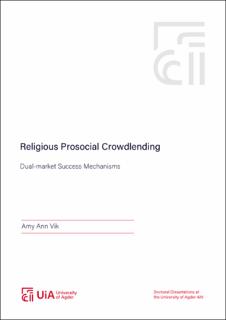Religious Prosocial Crowdlending - Dual-market Success Mechanisms
Doctoral thesis
Published version
Permanent lenke
https://hdl.handle.net/11250/3087476Utgivelsesdato
2023Metadata
Vis full innførselSamlinger
- Doctoral Dissertations [378]
- Publikasjoner fra CRIStin [4037]
- Scientific Publications in Management [143]
Originalversjon
Vik, A. A. (2023). Religious Prosocial Crowdlending - Dual-market Success Mechanisms. [Doctoral dissertation]. University of Agder.Sammendrag
Crowdfunding is a relatively new and rapidly growing global phenomenon that has appealed to academic curiosity. At its crux, it is rooted in the communal philosophy of greater good. The online technological intervention can be traced back to 2006, while the phenomenon took center-stage in the midst of the 2008 Global Financial Crisis. Over a decade and a half, the crowdfunding industry has grown into several distinct forms and business models. This dissertation started with a systematic literature review that broadly considered four mainstream business models of crowdfunding, and how it is possible to bridge the knowledge gaps left behind. This led to two empirical papers, motivated by the World Bank’s recommendation of a hybrid type of crowdfunding called prosocial crowdlending, to alleviate poverty from the developing economies, where poverty alleviation is the first of the United Nations’ 17 Sustainable Development Goals. While considering the developing economies that are innately non-secular, Islam was one of the religions that did not contribute to economic success as per the extant literature. On the contrary, such Islamic developing economies have thriving religious markets. This presented a dichotomy between theory and practice and a research gap that needed to be addressed. Insights from Max Weber that religions such as Christianity have clearly contributed to economic development of the West were recalled. These insights were applied in the empirical papers focusing on Islam, extending Weber’s seminal work from west to east. The findings of the empirical papers suggest that Islam does contribute to economic growth, albeit in a welfarist sense rather than in a capitalist sense. The overall contribution that this dissertation makes to the religious prosocial crowdlending is in identifying its dual-market success mechanisms through the developed theories and integrated typologies. These explain how religious capital is being converted to economic capital facilitated by trust in otherwise low-trust developing economies, on the supply side, and religious rationality that encourages sustainable micro-entrepreneurship despite the longstanding duality between religion and reason, on the demand side. In doing so, this dissertation also explains how Islam contributes to the economic welfare of such economies, and how to channelize religious capital towards economic development by utilizing technologically enabled religious prosocial crowdlending as a strategic philanthropic tool, to successfully impact poverty by enabling micro-entrepreneurship.
Beskrivelse
Paper I is excluded from the dissertation due to copyright.
Paper II and III are excluded from the dissertation until it is published
Består av
Paper I: Shneor, R. and Vik, A.A. (2020), "Crowdfunding success: a systematic literature review 2010–2017", Baltic Journal of Management, Vol. 15 No. 2, 149-182. Emerald. Published version. https://doi.org/10.1108/BJM-04-2019-0148Paper II : Vik. A. A. (2023). Trust in Religious Prosocial Crowdlending. (Forthcoming). Journal of Business Ethics. Full-text is not available in AURA as a separate file.
Paper III: Vik A. A. & Alaassar, A. (2023). Rationality in Religious Prosocial Crowdlending. (Forthcoming). Journal of Small Business Economics. Full-text is not available in AURA as a separate file.

